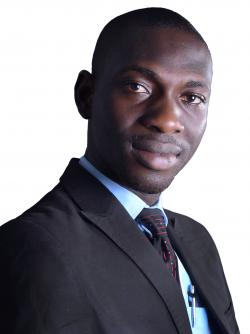
Adedoyin Adeleke
Founder, International Support Network for African Development (ISNAD-Africa)
Ibadan, NigeriaAge: 29
Tell us a bit about yourself!
I am a renewable energy researcher, the founder of the International Support Network for African Development (ISNAD-Africa), and a Doctoral researcher within the UNESCO Chair in Energy for Sustainable Development at the Politecnico di Milano, Italy. I also hold a Bachelor’s degree in Mechanical Engineering from Obafemi Awolowo University and a multidisciplinary Master’s degree in Energy Studies for the University of Ibadan, with a specialization in renewable energy. For these I have received scholarships from the Nigerian and Italian governments and the MacArthur Foundation, and I was recently named a 40 Under 40 Changemaker in the global solar energy industry by the US-based Renewable Energy World.
At ISNAD-Africa, I initiated the Mentoring for Research Programme, which establishes technical and thematic mentoring relationships between students conducting research on sustainable energy, environment and climate change in African universities, and accomplished researchers and professionals across the globe. I have also served as country contributor to various global reports on sustainable energy, including the Renewable Energy Policy Network for the 21st Century’s (REN21) 2018 Global Status Report on renewable energy.
What inspired you to become a champion for the environment and environmental education?
Africa is too rich to be poor! I began to explore the “development” concept from a young age. Over time, I realised that Africa’s poor performance on development indices is due to the high level of energy poverty which limits the transformation of our abundant resources to wealth. Amazingly, we have huge potential for solar, hydro, and wind energies, which are grossly underexploited. Therefore, I was determined to find out the reasons why a continent abundantly rich in energy resources could be so poor in energy supply. Surprisingly, I found that the lack of energy training and research on sustainable energy topics is among the root causes.
The advanced level of renewable energy education and research in many developed nations account for their global leadership in renewable energy exploitation and use. On the other hand, African countries, with higher renewable energy potential, account for the lowest uptake in the world due to inadequate renewable energy education and research. After identifying this major barrier, I decided to build a career to bridge the knowledge gap and help Africa raise a new generation of experts who will use their knowledge and expertise to facilitate a clean energy transition in Africa, to catalyse sustainable development on the continent. Africa is too rich to be poor, I choose to Act!
What advice would you give to the next generation of leaders that are looking to bring about positive change in their communities through EE?
Over time, I have realized that there are a lot of youth with innovative ideas in environmental education but face many barriers implementing them, especially in developing countries where environmental awareness is still emerging. I discovered these challenges early and devised strategies that have helped me and that I believe will come in handy for the next generation of leaders as well:
- Don’t wait for support, and start small. Every big idea can start small! Break down the big, ambitious project into smaller pieces that can be implemented with little or no support. With small projects you will gain experience and trust. Once prove to the world that you have “content,” then you will be amazed at how quickly the world can get you “containers” (or support) to upscale and achieve the “big picture.” So, lay that first block!
- Leverage partnerships. Multi-stakeholder platforms tend to be more effective than isolated initiatives, so get other organizations involved (see Sustainable Development Goal #17). Consider requesting in-kind organizational support rather than funds from partners, which is generally more appealing to organizations. In-kind support is also an efficient cost-minimization strategy.
- The impact of environmental educators is not always easily seen and recognized, especially in developing economies where sustainability is still an emerging topic. Environmental educators must therefore be self-encouraged and self-motivated, committed and consistent.
Above all, you must see your efforts as a “Calling” and your unique contribution to global development.
Who do you look up to as inspiration for your work?
I have met and been influenced by many great achievers in the field of environmental education. However, as my professor and mentor at Politecnico di Milano, Professor Emanuela Colombo’s influence on me has been multidimensional and very unique. Her strong and demonstrated passion for sustainable development and environmental education in Africa has been a particularly source of inspiration to me.
What pro-environmental behavior do you think would make a big impact if everyone in the world started doing it?
Over 70 percent of global electricity consumption is still generated from fossil fuels, facing us with the challenge of climate change from greenhouse gases emissions. While renewable energy is on the rise globally as a means to promote sustainability and energy, energy efficiency could have even more potential to save the planet by reducing energy demand without reducing human comfort. Inefficient energy usage is a global setback for both developed and developing economies, but we can reach great milestones simply through behavioral changes to improve our global energy efficiency levels.
I look forward to a world to where everyone has access to and uses just as much electricity as they need, at the highest level of efficiency. I therefore urge all of us to only power on electrical appliances and machines when they are needed!